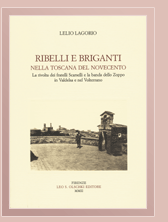 |
Lelio Lagorio,
Ribelli e briganti nella Toscana del Novecento. La rivolta
dei fratelli Scarselli e la banda dello Zoppo in Valdelsa e
nel Volterrano, Olschki, Firenze, 2002, pp. 152 e 35
tavole fuori testo
Quaranta anni di storia
italiana � dalla fine dell�Ottocento alla seconda guerra
mondiale � visti dal cuore della Toscana centrale.
L�attenzione � rivolta in particolare al ruolo dei gruppi
rivoluzionari e alla drammatica vicenda di una famiglia
anarchica che, scegliendo anche la via del brigantaggio,
esalt� lo spirito ribelle del territorio e fece a lungo
parlare di s�, prima di essere travolta dalla forza dello
Stato e costretta al carcere, al confino e all�esilio.
L�autore sottolinea con rispetto e con umana partecipazione
le prove coraggiose offerte da tanti militanti della
sinistra estrema ma evidenzia l�errore storico del
massimalismo che ha condizionato negativamente lo sviluppo
della societ� italiana. Il �Journal
of Modern Italian Studies�, edito dalla Universit� di
Connecticut (USA), nel numero 9 del 2004 ha dedicato al
libro una lunga recensione a firma F.Sabetti, McGill
University. Trascriviamo qui il primo e l�ultimo capoverso
della recensione.
Lelio Lagorio is best known among English speaking social
scientist as a former president of the regional government
of Tuscany and minister in several national governments
before the 1990s. The book under review brings out a
less-known fact: in more recent years Lagorio has turned his
interest and skills to the study of local history. This book
is a welcome effort�.Lagorio brings to life about forty
years of Italian history, from the end of the nineteenth
century to World War II, seen from the heart of central
Tuscany in the Valdelsa-Certaldo (birthplace of Boccaccio)�.Certainly,
the calm and pleasant look of the town gives little or not
hint of its rich rebellious and revolutionary history, which
began whit the Biennio Rosso and ended with Fascism. The
volume focuses on the dramatic vicissitudes of the men and
women of an anarchist family, the Scarsellis, who, having
chosen the road of brigandage, were eventually forced in to
prison, political confinement and, finally, escape and exile
in the Soviet Union.�.Lagorio�s account is not a scholarly,
detached account. The author can be criticized for not
writing a more disciplined narrative. But there is no
denying his book is a useful addition to our knowledge and
understanding of what happens to common people when they,
aspiring to self-government and struggling to act for the
common good, are caught up in a vortex of movements and
events beyond their own world and grasp. The not infrequent
human goodness and nobility of the Scarsellis, particularly
of Oscar�s sisters, shine through. To remain true to oneself
in terrible circumstances is perhaps the chief, general
lesson that we can learn from the rebels and brigands in
twentieth-century Tuscany. What made those Tuscan anarchists
unique and what made them similar to rebels and brigands in
other parts of Italy and the world is worth exploring.
Perhaps it�s time to return to Hobsbawm for insights.
|
